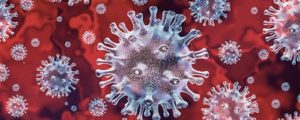
- Details
- By Native News Online Staff
Two Native American tribes have reported their first cases of the COVID-19 virus, while the Navajo Nation reported Tuesday that an additional 20 individuals tested positive for the virus.
On Tuesday morning, Cherokee Nation and Cherokee Nation Health Services reported the tribe’s first positive case of novel coronavirus, also known as COVID-19. The male patient is a Cherokee Nation citizen from Adair County in his 40s, according to a statement. Positive test results were confirmed on March 24. The patient is self-quarantined.
Later, on Tuesday afternoon, the Cherokee Nation released information that a tribal employee tested positive for COVID-19, according to a report in the Muskogee Phoenix. Both individuals live in Adair County, according to the report.
The Cherokee Nation is following all safety protocols recommended by the Centers for Disease Control and Prevention and Indian Health Service. This includes Cherokee Nation health officials contacting those people who may have had direct contact with the patient, according to a statement.
The report follows updates on COVID-19 cases from Navajo Nation, which spans three Southwestern states, and the Gila River Indian Community near Phoenix.
On Tuesday, the Navajo Dept. of Health and Navajo Area Indian Health Service reported a total of 20 additional COVID-19 cases on the Navajo Nation. Ten cases were reported Tuesday afternoon and another 10 were reported Tuesday evening, bringing the overall total to 49 cases for Navajo people. This includes 30 cases in Navajo County, seven in Apache County, six in Coconino County in Arizona, four in McKinley County, and two in San Juan County in New Mexico.
The Public Health Emergency “Stay at Home Order” remains in all counties, requiring residents of the Navajo Nation to remain home and isolated and all non-essential businesses to close to prevent the further spread of the COVID-19 coronavirus.
Gila River Indian Community announced the first two cases of COVID-19 on Monday night. One of the patients is a tribal member; the other is a member of another federally recognized tribe. Both had presented themselves to Gila River Health Care with symptoms and were tested. The test results came back as positive. Both patients are at home in isolation, according to a statement.
Gila River Indian Community Gov. Stephen Roe Lewis issued executive orders on Monday that limits government work to essential employees, prohibits evictions and utility shut offs, and limits gatherings to 10 people or less. The Gila River Indian Community has also closed its schools and gaming operations.
More Stories Like This
Native News Weekly (August 25, 2024): D.C. BriefsDeb Haaland Earns Endorsement From Communications Workers of America Local 7076
University Soccer Standout Leads by Example
Two Native Americans Named to Democratic Congressional Campaign Committee's“Red to Blue” Program
Cheyenne River Youth Project Hosts Young Women’s Winter Camp as Part of Lakota Culture Internship
Help us defend tribal sovereignty.
At Native News Online, our mission is rooted in telling the stories that strengthen sovereignty and uplift Indigenous voices — not just at year’s end, but every single day.
Because of your generosity last year, we were able to keep our reporters on the ground in tribal communities, at national gatherings and in the halls of Congress — covering the issues that matter most to Indian Country: sovereignty, culture, education, health and economic opportunity.
That support sustained us through a tough year in 2025. Now, as we look to the year ahead, we need your help right now to ensure warrior journalism remains strong — reporting that defends tribal sovereignty, amplifies Native truth, and holds power accountable.
 The stakes couldn't be higher. Your support keeps Native voices heard, Native stories told and Native sovereignty defended.
The stakes couldn't be higher. Your support keeps Native voices heard, Native stories told and Native sovereignty defended.
Stand with Warrior Journalism today.
Levi Rickert (Potawatomi), Editor & Publisher

